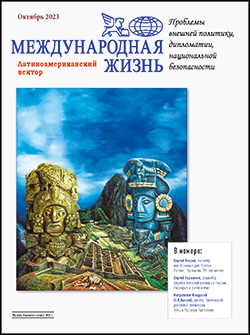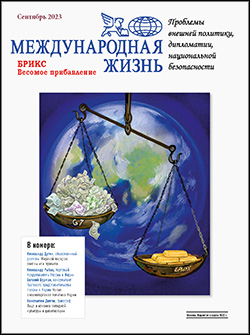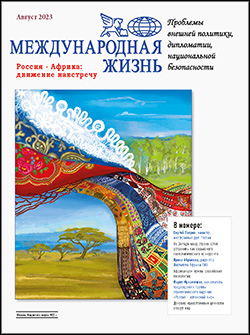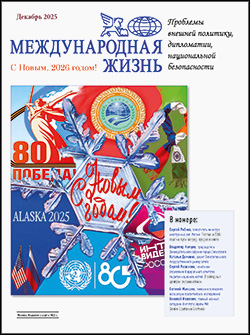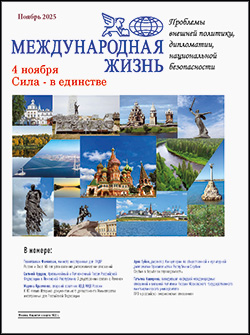POLITICS
V. Annenkov, L. Kononov. A nuclear world as a phenomenon of the globalization process
Under the influence of the globalization process in the nuclear sphere, some states that have nuclear weapons and nuclear technology in the 21st century, have formed a completely new international system. This is a geopolitical system of nuclear dependant states, with such systemic properties, as for example, stability, sustainability and security, as well as the presence of dangers and threats which are common to all countries with nuclear capabilities.
Dr. Jaap W. de Tavan. Russia and the EU: Cooperation is necessary
On the road to normal relations there are not only differences in language and distance between states. The development of the best contacts is also complicated by periodic events of a geopolitical nature. This is a pity, especially since so many opportunities exist to enhance and further strengthen our relationships.
A. Agasaryan. Eurasian integration as a new paradigm of development of the post-Soviet space
Eurasian integration is a natural and logical process of evolution in the post-Soviet space. The artificially fragmented economic skeleton of a previously unified single state has gradually fused together, and the torn ligaments of its political boundaries are being restored, forming a sound basis for the harmonious development of the macro-region.
K. Kachalin. A discussion of the NATO bombing of Serbia, 15 years after
In the spring of 1999, the member countries of NATO and the United States (which have a combined population of almost 600 million people) unleashed their military might against 10 million Serbs. Serbian journalists Milovan Dretsun and Zoran Mladenovic discussed how and why it happened.
V. Vasilyev. Gerhard Schroeder: person, politician, diplomat,
Among the most prominent political figures in Europe at the turn of this century, Gerhard Schroeder holds a special place. It is impossible to imagine the current development of Russian-German relations without him, laying down in them, as they say, an economic base. The transformation of these relations is forming the backbone of a united Europe.
UKRAINIAN VECTOR
S. Filatov. One must be a coward to miss the chance of returning to your homeland
When at 8:00 am on March 16th polling stations opened all over the Crimea, there were already queues of people standing enthusiastically together. Many got up before dawn and came ahead of time to stand before the closed doors.
N. Platoshkin. The Organization of Ukrainian Nationalists and its relationship with Nazi Germany
In February 2014, a nationalist coup d’état took place in Kiev, the main impact of which was undertaken by the ideological followers of the Nazis and Bandera, who somewhat euphemistically called themselves the "Right Sector." In connection with this it is worth mentioning, that in his time Bandera and his Organization of Ukrainian Nationalists wanted to “restore order.”
V. Surguladze. The Maidan protests: draw your own conclusions
The Ukraine has shown the world another glaring example of how the West involve themselves in the organization of low intensity military operations. Today, there is hope that the Ukrainian example (unlike Serbia, Iraq, Libya and many others) will not be recorded for history, and Western political scientists and experts in political upheavals and the "defense of democracy" will not be able to list it amongst their achievements.
Robert Sharven. The Ukrainian issue: a step in the destruction of the foundations of international law by the Western powers.
International law is often ignored, as it becomes an obstacle to political or private forces. It is mentioned only when it is in this interest of a State. This is especially true of the United States, which refuses to perform most of its multilateral obligations and refers to them only in exceptional cases. That is what we are now seeing in the Ukraine.
JUBILAEUS
Congratulations to A.G. Oganesyan
Congratulations to A.S. Dzasokhov
CULTURAL DIPLOMACY
A. Kramarenko. Geoff Dyer’s book the "Zona": seeking to understand the magic of the film by Andrei Tarkovsky, the "Stalker", (an unsent letter to the author)
"Zona" can be shown to be an incarnation of an omnipresent God, which relates to human existence through what is called conscience or moral law. Such a view would be justified in terms of the continuity of traditional Russian literature which Tarkovsky’s films are an integral part of.
A. Kolesnikov. Russians in Turkey: the eternal memory and forgotten graves
The history of our compatriots living in Turkey is already more than ten centuries old. Merchants and sailors, artists, soldiers, clerics - in short, a lot of Russian people have visited here. Among the first Russians to have arrived and stayed for a long time on Turkish territory, were also Russian diplomats, who not only happened to visit all over the country, but also spent months at a time behind prison bars during the numerous Russian -Turkish wars.
O. Egorova, A. Moiseev. “Breguet’s” Time.
Behind every clock lies a history, even if it is not worth writing a novel about it, the story is still worth telling. After France, England and Spain, Breguet attracted the attention of Russia, which was far away and mysterious to him. He sold his first clock in the country d in 1801. At first, trade was conducted through Russian diplomats in France and Spain, and then via special couriers, and later the Russian branch of Breguet was opened in St. Petersburg.
Katrina Similla. Today, more than 60 thousand people are involved in our work.
Currently, the work of the Centre involves 132 countries. We hope it will soon be 133 when Russia again joins our ranks. The center was established by UNESCO in 1956, and the Italian government offered to locate it in Italy.
Читайте другие материалы журнала «Международная жизнь» на нашем канале Яндекс.Дзен.
Подписывайтесь на наш Telegram – канал: https://t.me/interaffairs

 14:04 16.04.2014 •
14:04 16.04.2014 • 